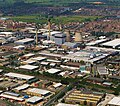Portal:Berkshire
Welcome to the Berkshire portal

The Royal County of Berkshire, commonly known as simply Berkshire (/ˈbɑːrkʃɪər, -ʃər/ ⓘ BARK-sheer, -shər; abbreviated Berks.), is a ceremonial county in South East England. It is bordered by Oxfordshire to the north, Buckinghamshire to the north-east, Greater London to the east, Surrey to the south-east, Hampshire to the south, and Wiltshire to the west. Reading is the largest settlement and the county town.
The county has an area of 1,263 km2 (488 sq mi) and a population of 911,403. The latter is concentrated in the east, the area closest to Greater London, and includes the county's largest towns: Reading (174,224) Slough (164,793), Bracknell (113,205), and Maidenhead (70,374). The west is rural, and its largest town is Newbury (33,841). For local government purposes Berkshire comprises six unitary authority areas: Bracknell Forest, Reading, Slough, West Berkshire, Windsor and Maidenhead, and Wokingham. The historic county included the parts of Oxfordshire south of the River Thames, which formed its northern border, but excluded Caversham and Slough.
The Berkshire Downs, a chalk downland and area of outstanding natural beauty, occupy the west of the county. They are the source of the River Kennet, which flows east through Newbury before meeting the Thames at Reading. The Thames then forms Berkshire's northern border, flowing past Maidenhead, before entering the county and flowing past Slough and Windsor. The south-east of the county contains Swinley Forest, a remnant of Windsor Forest now used as a forestry plantation.
There is evidence of prehistoric settlement on the Berkshire Downs, including the Iron Age Uffington White Horse, now in Oxfordshire. In the Anglo-Saxon period the region was contested by Mercia and Wessex, and Alfred the Great was born in Wantage, also now in Oxfordshire. Windsor Castle, which would become the official country residence of the British monarch, was built after the Norman Conquest. The county has been the site of several battles, particularly during the First English Civil War, when Reading and Wallingford were besieged two battles took place at Newbury, in 1643 and 1644. The proximity of the east of the county to London led to development from the nineteenth century, when Slough became an industrial centre and Bracknell was designated a new town. Software development and high-tech industry dominate the economy in the east, but the west remains an agricultural region. (Full article...)
Selected article
Aldermaston /ˈɔːldərmɑːstən/ is a village and civil parish in Berkshire, England. In the 2011 census, the parish had a population of 1,015. The village is in the Kennet Valley and bounds Hampshire to the south. It is approximately 8 miles (13 km) from Newbury, Basingstoke, and Reading and is 46 miles (74 km) from London.
Aldermaston may have been inhabited as early as 1690 BCE; a number of postholes and remains of cereal grains have been found in the area. Written history of the village is traced back at least as far as the 9th century CE, when the Anglo-Saxon Chronicles showed that the Ealdorman of Berkshire had his country estate in the village. The manor of Aldermaston was established by the early 11th century, when the village was given to the Achard family by Henry I; the manor is documented in the Domesday Book of 1086. St Mary the Virgin Church was established in the 13th century, and some of the original Norman architecture remains in the building's structure. The last resident Lord of the Manor, Charles Keyser, died in 1929. Aldermaston Court, the manor estate and house, was requisitioned for armed forces use during the Second World War.
The name "Aldermaston" is well known in connection with the UK's nuclear weapons programme, as well as the Campaign for Nuclear Disarmament. The Atomic Weapons Establishment (AWE), which develops, maintains, and disposes of the UK's nuclear weaponry is in the parish. Built on the site of the former RAF Aldermaston, the plant has been the destination of numerous Aldermaston Marches. Until 2006, the village was home to the Aldermaston Pottery, which was established by Alan Caiger-Smith and Geoffrey Eastop in 1955. (Full article...)
Selected biography
Vivian Dennis Busby (19 June 1949 – May 2024) was an English professional footballer and manager. He played for Wycombe Wanderers, Luton Town, Newcastle United, Fulham, Norwich City, Stoke City, Sheffield United, Tulsa Roughnecks, Blackburn Rovers and York City. (Full article...)
Topics
History: Battle of Reading (871) • Battle of Reading (1688) • First Battle of Newbury • Second Battle of Newbury • Siege of Reading
Geography: River Thames • Swinley Forest • The Ridgeway • Walbury Hill • Windsor Great Park
Towns: Ascot • Bracknell • Crowthorne • Earley • Eton • Hungerford • Maidenhead • Newbury • Reading • Sandhurst • Slough • Thatcham • Windsor • Wokingham • Woodley
Politics: Parliamentary constituencies • Parliamentary representation
Culture: Henley Royal Regatta • Museum of English Rural Life • Reading festival • Windsor Castle
Selected pictures
Did you know
- ... that today's funeral procession of Elizabeth II to Windsor Castle started at the gate to Shaw Farm?
- ... that three gasholders at the Windsor Street Gasworks were painted in the claret and blue colours of local football team Aston Villa?
- ... that comic book artist Barry Windsor-Smith wrote, drew, inked, and lettered every page of his graphic novel Monsters by himself?
- ... that Herbert James Gunn used a paper cut-out of Princess Elizabeth's corgi dog to help him paint his Conversation Piece at the Royal Lodge, Windsor?
Categories
Related portals
WikiProjects
Wikimedia
The following Wikimedia Foundation sister projects provide more on this subject:
-
Commons
Free media repository -
Wikibooks
Free textbooks and manuals -
Wikidata
Free knowledge base -
Wikinews
Free-content news -
Wikiquote
Collection of quotations -
Wikisource
Free-content library -
Wikiversity
Free learning tools -
Wikivoyage
Free travel guide -
Wiktionary
Dictionary and thesaurus



































